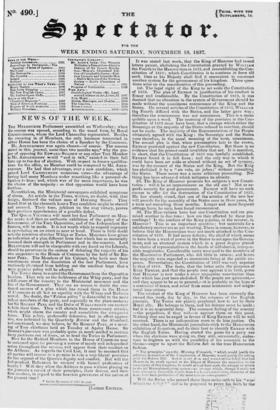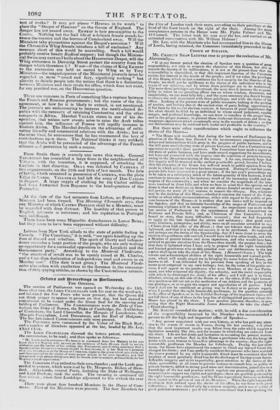It was stated last week, that the King of Hanover
had issued letters patent, abolishing the Constitution granted by WILLIAM the Fourth to the Hanoverians in 1833, and reestablishing the Con- stitution of 1819 ; which Constitution is to continue in force till such time as his Majesty shall find it convenient to construct another system for the government of his kingdom. Three ques- tions arise on the consideration of this proceeding. 1st. The legal right of the King to set aside the Constitution of 1833. The plea of ERNEST in justification of his conduct is flimsy and inadmissible. By the Constitution of 1819, it was decreed that no alteration in the system of Government should be made without the unanimous concurrence of the King and the States. On several articles of the Constitution of 1833, WILLI am ths Fourth differed with the States, and the latter gave way ; therefore the concurrence was not unanimous. This is a mean quibble upon a word. The meaning of the provision in the Con- stitution of 1819 must have been, that a change which either the Sovereign or the majority of the States refused to sanction, should not be made. The majority of the Representatives of the People ultimately agreed with the King : the Sovereign and the States were therefore, in the usual meaning of the term, unanimous. The second plea is that, when presumptive heir to the crown, ERNEST protested against the new Constitution. But there is no evidence that his protest could invalidate that act. It is manifest, in short, that the Constitution of 1833 was lawfully established. ERNEST found it in full force ; and the only way in which it could have been set aside or altered without an act of tyranny, was by the consent of the States and the King. But the King has abolished it by a "sic vole, sic jubeo;" without consulting the States. There never was a more arbitrary proceeding. No- tiling has been advancsd which mitigates its atrocity. 21. The King of Hanover promises his subjects a new Consti- tution : will it be an improvement on the old one ? Not as re- gards security for good government. ERNEST will have no such excuse to offer for the destruction of the Constitution of 1833. He has already stated, that one of the articles of the new law will provide for the assembly of the States once in three years, for a term not exceeding three months. Longer and more frequent sittings have, lie says, been found inconvenient. 3d. The Hanoverians have lost one Constitution and are pro- mised another in due time : how are they affected by these pro ceedings ? Is the conduct of the King popular, or the reverse, in Hanover ? This is an important question ; but materials for a satisfactory answer are as yet wanting. There is reason, however, to believe that the Hanoverians were not much attached to the Con- stitution of 1833. It bad many defects; the chief of which seems to have been a want of power in the States to act upon the Govern- ment, and an electoral system which in a great degree placed the choice of representatives in the hands of self-elected, irrespon- sible magistrates. Considerable sums were paid to the members of the Hanoverian Parliament, who did little in return; and hence the majority were regarded as sinecurists living at the public ex- pense. Nevertheless, the Constitution of 1833 was very superior to that of 1819. The facts, that the latter suits the purposes of King ERNEST, and that the people rose against it in 1830, prove that Hanover is now under a more unpopular constitution than that which has just been abolished. If the people are quiescent,— and they appear to be so in general,—it is probably in the hope of a remission of taxes, and relief from some aristocratic and magis- terial impositions. The conduct of the King of Hanover has been earnestly dis- cussed this week, day by day, in the columns of the English journals. The Tories are plainly perplexed how to act by their Royal ally. He belongs to them, and his defence must be made; but it is an ungrateful duty. The common feeling of the country —the prejudices, if they will—is against them on this point. Nothing that can be urged in favour of King ERNEST will be well received. There is an indisposition even to do him justice. On the other hand, the Ministerial journalists stick to the Hanoverian exhibition of despotism, and do their best to identify ERNEST with the English Tories. Having started the game for a party use when the elections were going on, they still, occasionally, endea- vour to frighten us with the possibility of his accession to the throne—eager to upset the Reform Act in the true Hanoverian fashion.
" The principles," save the Morning Ctroniele, " which would justify the arbitrary ihstruction of the Constitution of Hanover, would justify the setting asi.k the Reform Bill. And it is our fin and conscientious billet', that had Heaven in its wrath opened to the Despot of Hanover the succession to the sores eignty of this kingdom, he would at least have made the attempt to return to the old Boronglimongering system—al attempt which, though It could not hare ultimately succeeded, with, from Cie loiitvmi unrcl..iitin.z character of the matt, have been productive of the most rain.,us coniequences."
Will the Swiss who penned these lines make oath to his "cow; scioilti.ms &eV " and is he prepared to prove his faith by the test of works ? It may yet please " Heaven in its wrath" to place the "Despot of Hanover" on the throne of England. The danger has not passed away. ERNEST is heir presumptive to the Crown. Nothing hut the frail life of a delicate female stands be- tween the country and the horrors of Cumberland sway. Will the Ministers take precautions against the Despot's accession ? Will the Chronicle's Whig friends introduce a bill of exclusion? Any measure short of this would be unavailing. Such a bill would probably receive hearty Radical support ; but though the Ministe- rial Swiss may cant and bully about the Hanoverian Despot, will the Whig statesmen in Downing Street protect the country from the danger which threatens it ? If not—if the claims of King ERNEST to the succession are held as sacred by Whig as by Tory Ministers—the magniloquence of the Ministerial journals must be regarded as mere 'sound and fury, signifying nothing" but alacrity to delude people into the notion that there is a distinction between Ministers and their rivals for office, which does not exist, for any practical use, on the Hanoverian question.



















































